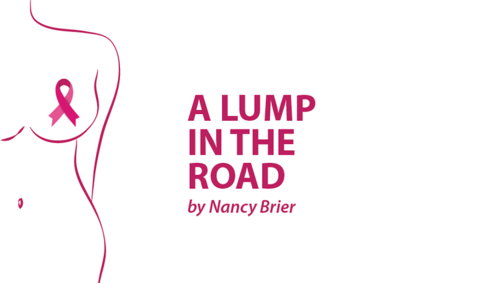
The good news is that I feel like I just had a cocktail. The bad news is that I always feel like I just had a cocktail. My head spins, my balance is off, and I’m light-headed.
For the second time, I’m weaning myself off a medication my oncologist prescribed after I finished chemo. It’s an antidepressant, but it also promises to help with the side effects from my chemo-induced menopause.
Weak from nearly a year of treatment, my body was exhausted when I met with my oncologist six months after my lumpectomy. Chemo, radiation, and surgery were all in the past, but intense heat consumed my body at the weirdest moments, waking me up sometimes in the middle of the night. “You’re covered in sweat,” my husband would mumble. Both of us found this phenomenon equal parts repugnant and fascinating. It was like I was watching a documentary about someone else’s odd life, except that I wasn’t. The stubble-headed, bloated, sweaty mess of a life was mine.
Brain fog, presumably from the chemo but maybe from the menopause, also made it hard for me to find words I used to have at my command. I like words, and I missed them.
At my check up, my husband insisted I describe these symptoms to my doctor. “It’s just menopause,” I said in the car as we made our way to UCSF’s Breast Care Center. “Eventually, every woman goes through it.” I assumed my discomfort would pass, that my inconveniences weren’t important enough to mention. After all, I never heard my mom talk about these issues, much less complain about them.
At the appointment, somewhat timidly, I explained what was going on to my esteemed physician. I felt foolish wasting her time with such trivia; after all, Hope Rugo, MD, is a renown specialist in Triple Negative Breast Cancer, not a bartender.
To my surprise, she listened intently. She asked probing questions, which I answered with the stoicism of a midwesterner. Although I’ve lived in California for decades, at heart I’m all Missouri.
“Actually, I think she’s depressed,” my husband said. He never misses an appointment and he never shies from expressing an opinion.
“It happens sometimes after treatment,” Dr. Rugo said, concern in her voice. She suggested the antidepressant, just a low dose. “It will help you sleep,” she said. “And sleep will help you heal.”
I want to be healed. But the idea of taking an antidepressant chafes at my psyche the way ill-fitting pants chafe my thighs. Having battled depression most of my life without meds, I felt a sense of defeat.
Two weeks after I started taking the prescription, I heard myself laugh. Sun streamed through kitchen windows that needed wiping, NPR streamed though my countertop speakers, and it occurred to me that I wasn’t just enduring my morning. I was enjoying it.
It’s the meds, I thought. Who knew? They were life-changing. I felt happy, a sensation so remote it seemed almost foreign.
For a year, I took the meds as directed, one little pill every single day. And I felt better — except for the nagging voice in the back of my head that taunted me for my dependency.
Lots of studies show that exercise is just as effective as medication for treatment of depression. Diet has a huge impact too, and I’ve found other outlets to be healing as well. Art, writing, spirituality, therapy and supportive friends have helped me tremendously. What I needed, I thought, was to exercise my God-given discipline now that I had a leg up from the meds.
And, like all medicine, antidepressants come with side effects. So, while I was traveling and discovered that I was out of pills, I decided to stop taking them. That abrupt withdrawal made me very, very ill. It was a rookie mistake to stop cold turkey.
This time I’m weaning myself off slowly. I tapered off from a pill a day to a pill every 36 hours. Then every 48 hours. And now, I hope, never again.
So, I’m enduring an “I-just-had-a-cocktail sensation,” from the minute I wake up, ’til I lay my spinning head on the pillow at night.
If I ultimately discover that stopping this medication was a mistake, I’ll come clean with my doctors, and we’ll decide together if I should take them again.
But until then, I know I can endure this nutty, spinning sensation until it goes away. Like all us cancer fighters, I understand this journey isn’t a sprint, it’s a marathon. A whole colorful marathon of endurance, insights, and odd body sensations. Kind of like a cocktail party, a really long one that I’m required to attend.
Cheers.
***
Note: Breast Cancer News is strictly a news and information website about the disease. It does not provide medical advice, diagnosis, or treatment. This content is not intended to be a substitute for professional medical advice, diagnosis, or treatment. Always seek the advice of your physician or other qualified health provider with any questions you may have regarding a medical condition. Never disregard professional medical advice or delay in seeking it because of something you have read on this website. The opinions expressed in this column are not those of Breast Cancer News, or its parent company, BioNews Services, and are intended to spark discussion about issues pertaining to breast cancer.


Thank you so much for writing this. Everything you described I feel but I thought it was nothing and I should not moan about it. I am going to have a different conversation with my doctor just to see what other options there might be for the way I feel. Your words have been so
helpful. Thank u 😊
It feels weird to share these intimacies about my life publicly – sometimes, I cringe when I hit that “send” button, but my hope is that by putting it out there, I can help other people going through the same thing. Thank you for letting me know that sharing my experience might help you with yours. God bless your journey.
I had endured hot flashes that made sweat drip off my nose during the day and dampened my pillow at night for 10 years before breast cancer and tamoxifen came into my life . Of course that included being awakened every 45 minutes for hot flashes during sleep. Tamoxifen ramped it up at least double. So like you I reluctantly brought it up to my gynecologist who prescribed Effexor. And like you, during travel, I had forgotten to take my pills and learned what it felt like to go cold turkey. Very disturbing. When I too decided it was time to wean myself off of it , I did it gradually. Low libido and loss of ability to orgasm eventually, over years, went away. I did not, fortunately, experience the one too many cocktail effect. After a recurrence six years after the original diagnosis, I am now on an aromatase inhibitor, and I’m back to hot flashes and sleepless nights. The interruption in my quality-of-life, the lowered ability to function at my best, and the knowledge that I am doing this to myself every time I take a pill, seems so unfair.
Thank you for bringing up a topic that, when we discuss it among outsiders, may make us look as though we’re ungrateful for having survived whatever our stage of cancer was. Thank you for talking about your experience so that we know we’re not alone in this struggle to accept the new normal. Thanks for giving us a place to complain about it to people who understand.
Wow, sweat dripping off your nose! That’s an image that will stay with me and help me get through whatever’s in store for me next. It also validates that these symptoms aren’t “all in our heads” or that they should go untreated. Best wishes to you on your journey.
I’m curious if the antidepressant was working why did you go off if it?
Great question, Shawn. Although the meds relieved my depression, they came with side effects. For me, the worst were the bad dreams. Most nights, shortly after I fell asleep, I was the star of my own horror movie and woke up terrified, too afraid to go back to sleep. But the relief I felt during the day from unrelenting sadness and lethargy made the nightmares worth it – sort of. The other concern I had was that the effect would eventually wear off and I’d have to up my dosage continually or switch to a new med. Now, I work out hard three times a week as part of a group, and often we run outside. I’ve had periods in my life when I’ve worked out intensely, but for some reason, this particular routine has really helped combat depression. A therapist friend did tell me that outdoor exercise with other people is very powerful, and he was right. If you or someone you love is suffering now, please accept my best wishes. Thanks for the comment – it’s really a treat to hear from a reader. Nancy